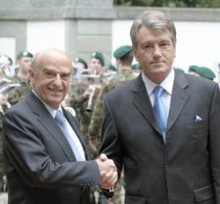Bern — Commenting on the visit of Viktor Yushchenko to Switzerland, the local press says bluntly that the Ukrainian president came to Bern to ask for financial aid. But it used to be just the contrary: in 1822 the penurious Swiss wine-makers would immigrate to Ukraine and populate fertile lands on the Black Sea coast in a hope for a better life.
Andr Liebich, a professor at the Graduate Institute of International and Development Studies (IHEID) in Geneva, believes that, by receiving financial aid from Switzerland, the Ukrainian president is using his last chance to reverse his ever-dropping popularity rating in a country that is in a “disastrous economic situation.” Clearly, this country’s image abroad leaves much to be desired. But let us get back to the visit itself.
On May 14, after two-hour negotiations at the Federal Council’s country estate Lohn on the outskirts of Bern, President Hans-Rudolf Merz of the Swiss Confederation and President Viktor Yushchenko of Ukraine made statements to the media.
Merz said that “the meeting took place in a warm atmosphere” and noted that both countries have very much in common. It is not only the mountains — “the Carpathians in Ukraine and the Alps in Switzerland” — but also the fact that neither Ukraine nor Switzerland are NATO or EU members; their territory offers transit routes for energy resources to other countries; and both countries are well known for profoundly respecting the principles of democracy. The two presidents discussed not only bilateral issues but also the European policies of their countries, the impact of the financial crisis on the economy, and their prospects for expanding multilateral cooperation.
Yushchenko noted with satisfaction that there are no political problems in the ever-growing and harmonious relations between Switzerland and Ukraine. “Our trade turnover has increased 2.2 times in the past year to about three billion dollars,” the president said. More than ten specific projects in various sectors of the economy are in the pipeline. Ukraine’s president requested his Swiss counterpart to officially support Ukraine in its negotiations with the European Free Trade Association (EFTA) countries because “Ukraine is going to sign a free trade agreement with the EFTA countries.”
Yushchenko also pointed out that Ukraine and Switzerland have one of the most liberal entry visa regimes for Ukrainian citizens. He said that, in connection with Switzerland’s accession to the Schengen zone, Ukraine has proposed optimizing the visa issuance procedure and is hoping for “a positive answer” from the Swiss side.
Asked about the possible date for completing the negotiations on a free trade agreement between Ukraine and EFTA, the president of Switzerland positively assessed the development of relations between Ukraine and Western countries and said they “are developing in the right direction.”
Did the summit discuss the possibility of Switzerland extending a credit to Ukraine? The Swiss president, who is also the minister of finance, diplomatically calmed his compatriots: “Today, as part of international cooperation, the State Secretariat for Economic Affairs (SECO) and the Development and Cooperation Directorate (DDC) are rendering Ukraine technological and financial assistance. We have encouraged the International Monetary Fund to issue a loan to Ukraine. Ukraine is a large and important country with a population of 46 million and a sizable economic sector. It is a country that is gradually opening, and we intend to continue supporting Ukraine’s development on both the bilateral and international level.”
It has already been disclosed that, after negotiating with Merz, Yushchenko met Philipp Hildebrand, the new president of the Swiss National Bank, to discuss further cooperation between the national banks of Ukraine and Switzerland.
And what if the Swiss really finance us? “Many a little makes a mickle,“ and we will perhaps ride out the crisis.







